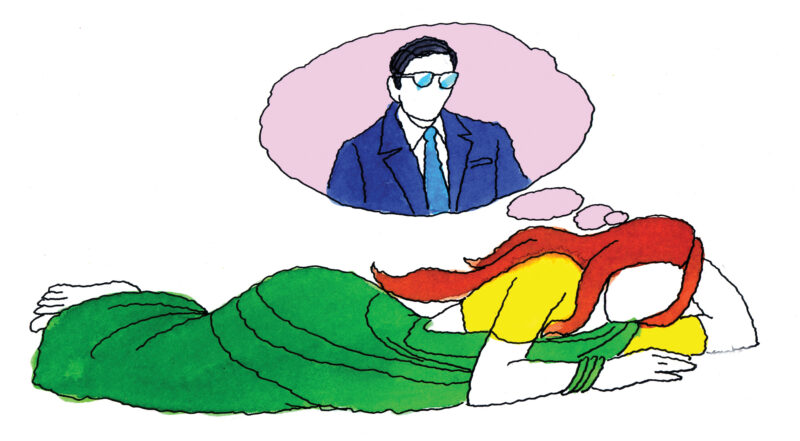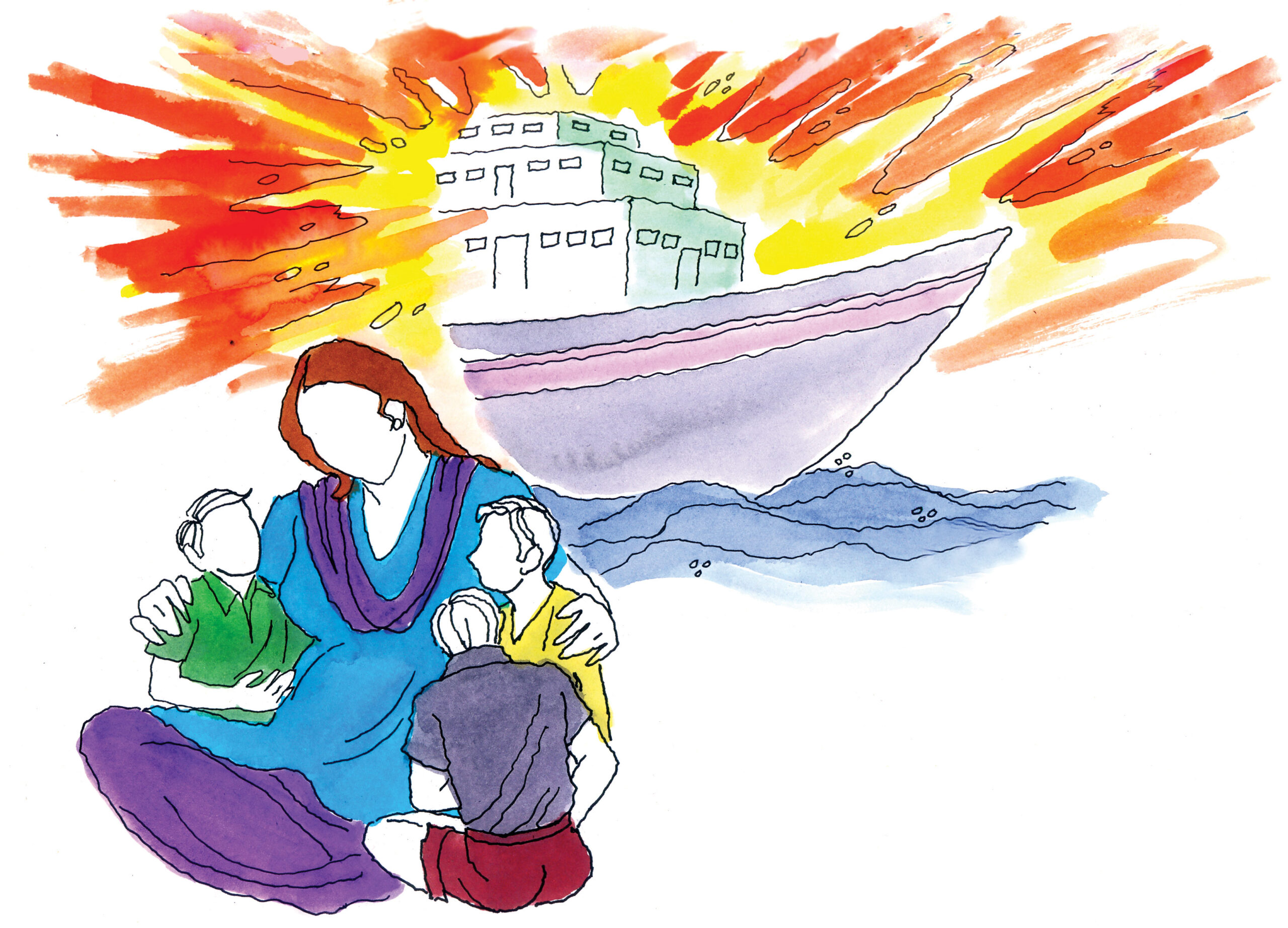All she had to do was to close her eyes to beam herself back in time-30, 40, 50 years back or more. Sometimes she was walking to school with her friends, her pavadai swirling around her bare feet. She could feel the eyes of the boys on the roadside and hear voices calling out her name making her scurry past, her eyes downcast. She was known as the ‘Rangoon Beauty’.
But most times she loved to linger on the tinkling of a cycle bell that gave wings to her feet. She would run to the balcony in time to see the handsome lad downstairs set off for work or study. Their eyes exchanged a delicious message and her breath came a wee bit faster.
The strong smell of vibuthi and tulsi filled her nostrils and made her open her eyes. It was the servant maid. “Pattieee. I have brought some prasad from the temple.” She blinked, loath to leave her memories behind. Thinking she had not heard, the maid repeated herself in an even louder voice. Why did they have to shout? Did being old mean being deaf? She did have a problem but surely not as bad as it was made out to be.
She sighed as she took the prasad and gazed at the wrinkles on her hand, the blue black veins twisting itself like the branches of an olive tree. She remembered her hands smooth and white as alabaster with another brown hand holding them firmly in its clasp. At times, it was difficult to believe that she had become so old. In her mind, she was still 70. She had to remind herself that she was 100.
The smell of the temple prasad took her back to the temple wedding. There had been a lot of opposition to their sagotra marriage. Family, friends and priests boycotted it. Her father stood firm and ramrod straight as he rallied a few staunch supporters to conduct a short and simple wedding, the beginning of a life long commitment.
Their so called ‘honeymoon’ (for such a thing never existed those days) was a 10-minute coach ride down the road for which they were taken to task severely and upbraided by his father as a totally wanton waste of money.
The shrill sound of an ambulance made her close her eyes. She was in the midst of war, in December 1941. She was carrying her fourth child and had been advised bed rest. The day the bombing began, the women and children were all rushed to the ship leaving the men folk behind to walk the land route from Burma to India. She had been bleeding but it stopped immediately as her body and nature took over the task of survival.
She gathered her money and jewels and tied them around her waist, gave her boys a single change of clothes and garnered some provisions. With her brothers, nieces and parents she clambered on the swaying rope ladder hanging by the side of the ship. Her father nearly fell and was caught just in time.
Would she ever see her husband again? Would they reach India alive? The agonising doubts and fears that jostled the 30-year-old heart and mind were pushed down and smothered in caring for her three young sons and her elderly parents.
The door bell rang, jangling her to the present. “Who is it?” she asked. “Fresh coffee powder from the shop, patti” accompanied the strong aroma of coffee wafting by her room. It suffused her nostrils and her head taking her on another journey.
They had all settled on the deck of the ship for only the very rich and eminent could get the cabins downstairs. The rest had to huddle on the deck exposed to the elements. Within minutes of casting off, the siren wailed, heralding another bout of bombing. She grabbed all the children and rushed down praying they would not be hit. Much later she heard the next ship had been bombed with no survivors.
Coming back on the deck later, she was shocked to find that all their provisions had been stolen. She managed to retrieve some milk powder and was able to feed small portions to the children till they touched land four days later. Pregnant and hungry, she watched another passenger polishing off balls of curd rice while she, herself, subsisted on nothing but coffee for the next four days. Maybe that was why her daughter was a coffee addict she thought wryly.
She squirmed trying to adjust her soft pillow. She thought of the months she slept on the floor without a pillow, having taken a vow not to use the bed till her husband returned. She could not bear the comfort of a mattress when she knew that he would be sleeping by the roadside or on mud and grass. She knew he had the option of taking the easier White Route reserved for the British and some select people but he would take the Black Route used by the Indians.
She relived the trauma of her travel; landing at Vizag, starved and tired. She had plenty of money tied to her waist but no food. A ship had landed just before them and the hungry refugees had devoured every morsel. The innkeeper had them wait till he prepared rice and a watery rasam that was served on dirty banana leaves. It tasted like nectar.

The family caught the train to Coimbatore at the station where people were packed like sardines. The children had to be pushed through the windows while the adults clambered in by the doors, hearts beating wildly with fear that they may be separated.
The immeasurable joy of his return, the birth of a girl child after three boys was enough compensation for all the heartaches. As refugees, they had to start all over again on a clean slate. She delved deep into her memories, memories so rich and varied—the agony of losing her only elder sister at a young age; trying her best to be more than an aunt to her six nieces; her husband’s rise to success and fame as a legal luminary; her life in Simla and in Delhi and her total involvement with her own children.
She survived a bad attack of TB and was bedridden with a gynaecological problem that left her weak and helpless. Back on her feet, she continued to care for her large extended family.
She thought of the occasions when she accompanied her husband to Rashtrapathi Bhavan for receptions; he, dapper in his suit and she, a picture of elegance in her Conjeevaram saree with flowers in her luxurious hair trailing the heady scent of jasmine and Tata’s eau de cologne. That was the ultimate in perfumes, more fresh and light than all the modern ones with fancy names and suffocating aroma. Her life was full, feeding her brood; attending the ladies club; learning Ikebana; dealing with tragedies in the family and trying to stretch the household money to the maximum extent possible. Time flew by.
Now at 100, she found each day crawling by at a snail’s pace. She had to depend on others to help her with the routine of life. Her spirit imprisoned in an ageing body, she insisted on being wheeled all around the house, to satisfy her unflagging interest and curiosity in everything. She had her foibles—she was the first one to admit that to herself even if she did not think of them as mere foibles. She would be upset if a visitor did not pay her enough respect. Her remarks on events and people came out scathing at times, even in their presence. But at this age one could voice one’s opinion without fear!
Her thoughts ran into one another, weaving in and out in the warp and woof of time. Faces and names floated around, some not very clear, smudged like yesterday’s kolam. Some memories were startlingly sharp edged and luminous. Those were always memories of Burma and early days in Simla or Delhi while the later days were shrouded in a mist. But hazy or clear, it was the memories that kept her going. She relived holidays with her husband in the US and Australia; celebratory family functions and yes, even gossip—delicious gossip of yesteryear film stars, friends and family. Life without memories was not worth living and the mind was the only place that remained totally private, shutting out the whole world to thoughts that were hers and hers alone.
She forgot names of her great grandchildren. She repeated herself and asked the same question many times over. She was impatient with herself for these signs of aging but at times refused to accept it as inevitable. She still read the newspaper from the first to the last page but forgot half of what she had read; was still interested in politics and her voice still rang strong and true when she spoke of women’s rights.
She was lucky enough to be surrounded by her children and family and to be waited on hand and foot. Her word was law. At 100 she was a source of inspiration with her positive thinking and cheerfulness.
When she was called a woman of substance, she thought of all the people in her family, her daughter, granddaughters, nieces and nephews—all offshoots of a huge banyan tree. Almost each and every one of them had battled with life, either a relationship gone sour; the trauma of divorce; losing a young child or a dear spouse; coping with debilitating diseases and at times staring death in the face. And yet none of them was depressed or bitter. She was surrounded by women of substance and men of great courage and determination who refused to be defeated by fate’s wanton blows. There was no lack of valour in the world and compared to the crippling and excruciating hardships of many women, her life had been good.
The telephone rang. It was the nurse-cum-maid who looked after her in the daytime to say that she would not be coming that day. She sighed. She remembered the girl’s life story–an alcoholic father (was there even one man who did not drink?) who had deserted his wife and three kids. The girl was the eldest. Her mother worked at a construction site carrying bricks on her head. Her brother ran errands at a shop and her youngest sister was in school.
Even so, the maid’s lot was better than that of women whose husbands beat them mercilessly or ran away with all the money. Out of a hundred women, there were probably five who were happily married. All the rest were tortured and yet they went about their daily chores quite cheerfully. What was the source of their strength? Was it the prayers repeated 108 times, visiting temples or performing religious rituals? May be they drew sustenance by going into a trance, believing in astrologers who fleeced them or taking it out on other women by torturing them. Or was it a strength born of deep rooted anger and frustration that erupted in a volcano of determination that swept away all signs of weakness?
There was no safe haven for women—rich or poor, educated or uneducated, Indian or foreign, conservative or modern, at home or outside. To survive and to be at peace with yourself, you had to be a woman of substance.
“Amma.” Her son’s voice came from far away. She opened her eyes slowly and rather reluctantly.
“I have been calling you for so long. You were fast asleep.”
“No. Not at all. I only had my eyes closed,” she said.
- By Malathi Jaikumar


